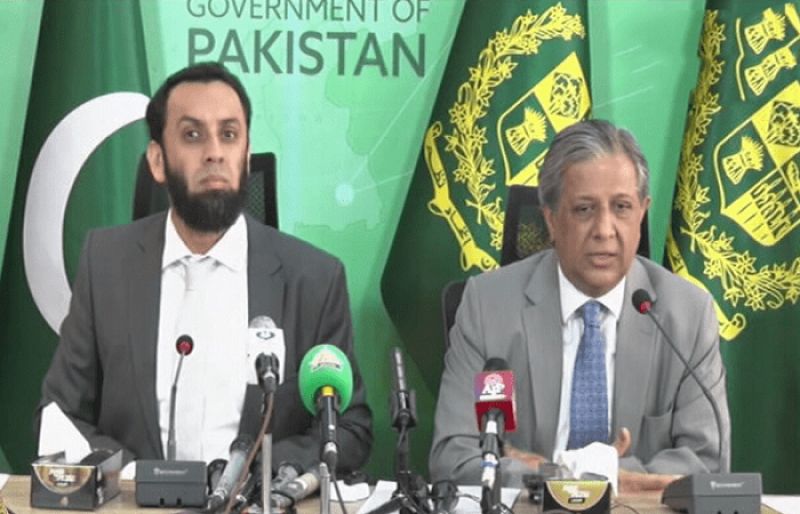Addressing a press conference in Islamabad alongside Information Minister Attaullah Tarar, the law minister said the issue — which he said dates back four decades — could “not be solved overnight in haste or due to someone’s anxiety or someone speaking on social media platforms or even court directives”.
The law minister emphasised that when discussing the issue of missing persons, it must be noted that Pakistan had performed the role of a frontline state in a war-ridden area for the past four decades, adding that the circumstances in neighbouring countries had further exacerbated internal challenges.
Azam noted that the people and army of Pakistan had paid an “unbelievable price” in the fight against terrorism with their sacrifices, adding that the same must be taken into consideration when finding a solution to the issue of missing persons.
The law minister noted that work towards solving the issuing of missing persons began under the PPP government in 2011 when the Commission of Inquiry on Enforced Disappearances was formed. Following that, the Supreme Court took notice of the matter and formed a commission.
Around 10,200 cases were sent to the commission, from which 7,900 cases have been solved while 23 per cent of the cases remain to be solved, Azam noted.
He said that during the tenure of the previous PML-N-led coalition government, Prime Minister Shehbaz Sharif had formed a committee alongside representatives of other coalition parties.
The committee met with various stakeholders during their visit to Quetta, the law minister said, recalling that he had asked for a report about missing persons.
Azam added that under the current tenure of Shehbaz, directives were issued to restart work on the inquiry of enforced disappearances, with the prime minister ordering that the committee be reconstituted. He noted that there will also be a “parliamentary presence” in the committee.
While acknowledging that a lot of work remained to be done with issues arising from both sides, Azam took a firm stance in noting that there was no lack of seriousness from the government about the issue.
He said the alleged involvement of government institutions in the issue could not be rejected outright, however, he added: “What needs to be seen is whether, till today, any solid or concrete evidence has come. From what I saw in the report, till I was on the committee, the answer is in the negative.”
The law minister further questioned whether inquiry reports, such as the one on missing persons, were always credible.
“Are people who have been registered as missing persons really missing?” he asked, recalling a case in Sindh where people registered as missing persons were actually serving jail time at a prison.
The law minister said the issue was not a simple one to solve and he would aim to resolve it through legal and political means by achieving a consensus amongst all stakeholders. The information minister also reiterated the same, as well as the government’s commitment to solve the issue.
However, he said it was the job of the executive to find a solution and any judicial committee would nullify the efforts of previous inquiry commissions and cabinet committees.
In late February, days before leaving his office, former caretaker PM Anwaarul Haq Kakar had appeared before the Islamabad High Court (IHC) — after being summoned for a third time — in a case pertaining to missing Baloch students.
In a January hearing on the same case, IHC’s Justice Mohsin Akhtar Kayani had remarked that a day would come when intelligence officials would also be held accountable and face prosecution for cases. In a subsequent hearing, he had observed, “The punishment of enforced disappearances should be the death penalty.”
The IHC had also issued directives for constituting a joint committee of directors general of the Intelligence Bureau (IB), Inter-Service Intelligence (ISI), and Military Intelligence (MI) for tracing the whereabouts of students from Balochistan who were allegedly missing.
However, the federal government had approached the IHC seeking to overturn the order.
51 more enforced disappearances in 2023
According to a report published by non-governmental organisation (NGO) Defence of Human Rights (DHR) in December last year, Pakistan reported 51 more cases of enforced disappearances in 2023.
“The total number of cases stands at 3,120, with 51 cases registered in 2023 alone. Notably, 595 individuals have been released and reunited with their families, 246 people have been traced, and 88 cases have sadly resulted in extrajudicial killings,” DHR said.
According to the report, 17 missing persons from Azad Jammu and Kashmir were released and the whereabouts of two others were traced while one was extrajudicially killed while 20 remained missing.
Out of the 82 missing persons from Balochistan, the whereabouts of 67 remained unknown, 12 were released, two were traced and one was extrajudicially killed.
In Islamabad, 47 people remained missing while 32 were released, seven were traced and three were extrajudicially killed.
Out of the 1,091 missing persons in Khyber Pakhtunkhwa, 121 were released, 792 remained missing, 151 were traced and 27 were extrajudicially killed. In Punjab, 343 were released, 323 remained missing, 76 were traced and 46 were extrajudicially killed.
In Sindh, 134 people remained missing, 70 were released, eight were traced and 10 were extrajudicially killed.


